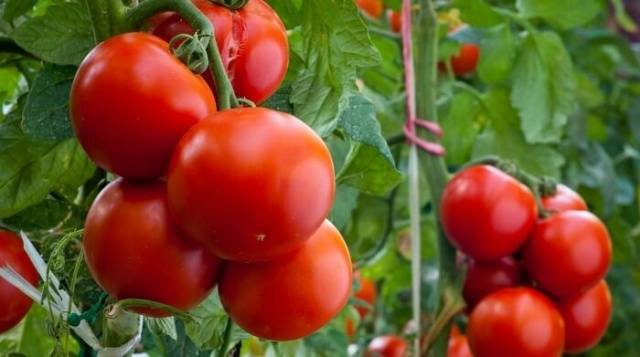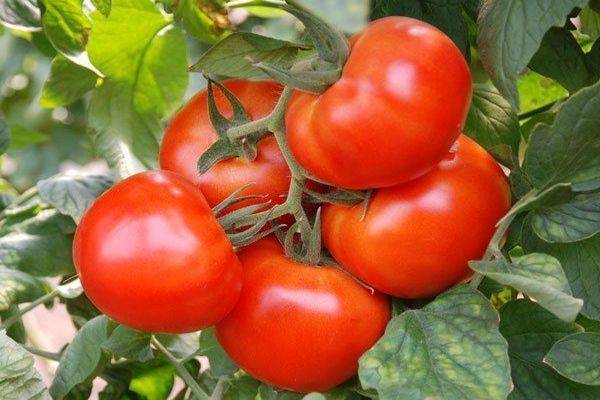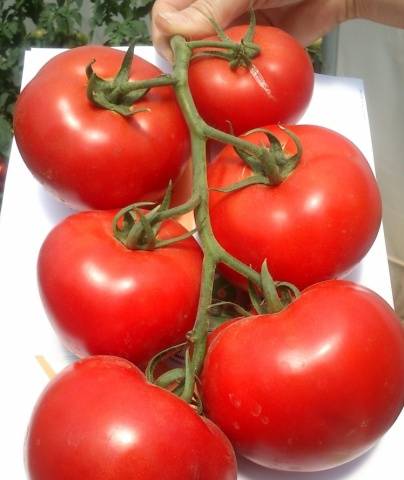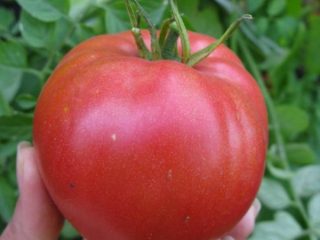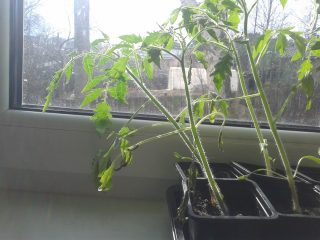Content
Tomato Kostroma is a hybrid species that is of interest to many farmers and gardeners. The variety is used for personal needs, as well as for large enterprises. The taste of tomatoes is excellent, they can be used for different purposes, so the look is universal. They are early maturing and have good visual characteristics. Before growing, it is recommended to find out in detail the characteristics and description of the Kostroma tomato variety.
Description
The plant belongs to the semi-determinant type, rather tall bushes that grow up to 2 meters. This height is achieved by planting seedlings in a greenhouse or shelters under a film.
As the reviews show, the Kostroma F1 tomato is not recommended for planting in the open field, since it gives poor results. The ripening period is quite early, from the moment of planting the seeds to the beginning of the first harvest, an average of 105 days pass. The bushes have many leaves of a standard form for vegetables, green in color.
For gardeners who cannot always be in the country, the variety is perfect. Tomato Kostroma f1 does not require much care, much easier to grow than indents.
A height of 2 meters is optimal for any greenhouse. From 1 sq. m. it is possible to collect up to 20 kg of tomatoes. Thus, one bush will yield a yield of 5 kg. Plant management is carried out in one stem, with the timely removal of stepchildren.
The advantage of the Kostroma tomato variety is a small number of stepchildren. Therefore, even when visiting a summer cottage exclusively on weekends, the bushes will not be densely overgrown. To maintain the desired shape of the plant, stepchildren are removed once a week.
There is no need to plant the variety too densely. The manufacturer advises placing plants with a distance of 40 cm in a row, and 60 cm between them. This planting provides enough light for the bushes, and the land is not depleted, which allows the tomatoes to receive the necessary amount of useful and nutrients. In addition, the distance between the bushes will make it possible to properly care for them, the likelihood of diseases decreases, especially with the departure of summer, when the temperature fluctuates and there may be fungus.
The video shows various varieties of tomatoes that can be grown using the greenhouse method, including Kostroma:
Advantages and disadvantages
Among the advantages of Kostroma tomatoes are the following:
- Excellent yield.
- Early ripening.
- Quite good transportability, at which the commercial qualities are preserved.
- Excellent immunity to many diseases and pests.
- The possibility of fruit emergence even during unstable temperatures.
- The tomato is not exposed to low humidity.
There are much fewer disadvantages of the variety, including:
- The need for the construction and use of a film shelter, greenhouses for growing.
- The need for plant formation using trellises.
- In order not to break off the brushes, they need to be tied up in a timely manner.
As you can see, the description of the tomato Kostroma has more positive sides than negative ones.
Fruit characteristics
Fruits are flat-round in shape, with a smooth structure. Their color is very bright, intense, red. The average weight of one tomato is 110 grams, the minimum indicators are fruits weighing 85 grams, and the maximum weight reaches 150 grams.
On the bushes, the fruits are collected in a brush, on which up to 9 pieces appear.The taste is dessert, which means it is ideal for salads, fresh consumption. Kostroma is good in sauces and ideal for salting. If planted on 1 sq. m. 3 bushes, then during harvest, each plant will bring 5 kg of tomato. During transportation, the peel and mold are not damaged.
The formation of brushes is carried out in 9-10 sinuses, and then appear in every second. After the formation of 10 brushes, it is recommended to pinch the crown. The pulp of the variety is quite dense, like the peel itself.
Instead of a review about the Kostroma tomato, it is better to see the photo:
Seedling
Seedling preparation should start based on the need for harvesting. If you want to get early tomatoes, then the seeds should be planted in early spring (March). Just in April, the seedlings will be ready for further transplantation.
Transplanting seedlings should be carried out when the soil in the greenhouse warms up to a stable 13 degrees. For the northern region, it will take more time for the earth to warm up, which means that the preparation of seedlings is carried out later. It is recommended to sow seeds in April and plant in May.
To get good seedlings, you need to use the following rules:
- Prepare the soil. For this, soil from the garden, peat and compost is used. A week before planting the seeds, you need to treat the soil with a solution of potassium permanganate, and water it a day.
- All seeds are calibrated, it is necessary to put in a solution of potassium permanganate for a quarter of an hour, dry.
- Put the finished raw materials on moistened ground, with a distance of 4 square meters. see Further, 2 layers of earth are poured, and the container is closed with glass or film, and left warm.
- When the first shoots appear, it is necessary to remove the film or other materials.
- During the formation of the first pair of leaves, a pick is made. Seedlings are transplanted into separate containers, you can use disposable cups, special containers.
40 days after planting, the seedlings should be ready for further action. It can be planted in a greenhouse, the sooner the summer resident does it, the faster the harvest will be.
Growing rules
After planting seedlings, you need to know some more rules to get a high-quality harvest. First you need to wait for growth and start forming bushes. As experienced farmers say, shaping is best done on a vertical trellis. It is imperative to tie up the brushes so that they do not break off.
After the appearance of 5 brushes, it is necessary to begin to remove the leaves, about 2-4 pieces from the bottom of the plant. Such a procedure should be carried out weekly in order to improve the ventilation of the soil, as well as enhance the nutrition of tomatoes with useful substances.
When up to 10 brushes are formed, then it is necessary to limit the growth of bushes. To do this, pinch the central shoot. It is important to leave a couple of leaves over the last brush.
Kostroma has good immunity and is not afraid of many tomato diseases. Therefore, the harvest can be obtained even at unstable temperatures and other negative factors. Further care consists only in loosening the earth, watering using warm water. By the way, the hybrid loves watering after sunset. Additionally, they are promptly deleted weeds, feeding is carried out throughout the growth and formation of the bush.
Given the description of the Kostroma tomato, their versatility, yield, many people use seeds as an annual variety for planting.
Storage and collection
For storage, it is recommended to use tomatoes that have not been frozen, otherwise they begin to deteriorate. The collection itself is carried out based on maturity, but it is recommended to collect them in August-September. It is best to choose a dry weather for this.
It is best to select tomatoes without damage, which will be dense, this will allow them to be preserved for a long time. They are laid in wooden boxes, covered with paper, and each layer of tomato is sprinkled with sawdust.After that, the container is lowered into the cellar, the humidity of which is no more than 75% and there is ventilation.
Diseases
As already noted, the immune system of Kostroma is strong, tomatoes are not afraid of many diseases. The variety best resists:
- Tobacco mosaic virus.
- Cladosporium.
- Fusarium.
Despite the strong immunity, general preventive measures will not interfere with the plant.
Testimonials
Conclusion
There is no need to doubt the planting of the Kostroma variety. If the summer cottage is equipped with a greenhouse, then the choice will be justified. The main advantage is the minimum maintenance requirements and the maximum yield.
